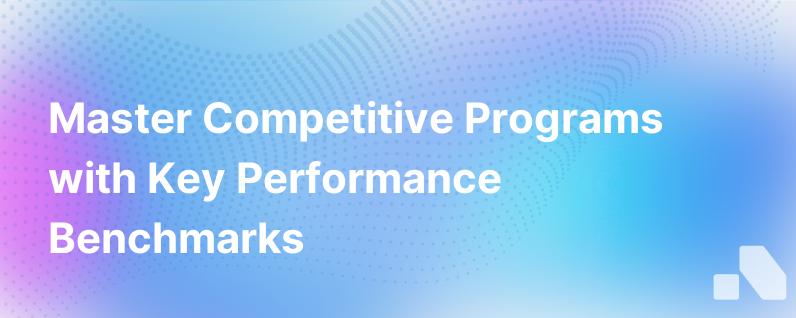
In the rapidly evolving marketplaces of today, having a competitive intelligence program to gain insights into the strengths and weaknesses of your competitors is critical. However, to be successful, it's equally important to understand the benchmarks of a competitive program to ensure you're measuring the right outputs and evaluating your progress accurately.
In this piece, we dive into the concept of competitive program benchmarks, why they matter, and how to utilize them for creating a formidable competitive intelligence strategy that propels your business growth.
Understanding Competitive Program Benchmarks
Competitive program benchmarks are the standards or norms used to evaluate the effectiveness of your competitive intelligence program. They are essentially a set of metrics that measure how successful your competitive program is in achieving its goals.
The benchmarks are highly valuable for businesses as they create a framework for analysis and evaluation, provide a reality check on where the company stands against competitors, and offer valuable insights for strategic decision-making.
Why Competitive Program Benchmarks are Important
These benchmarks are crucial because they:
- Help you to set realistic and achievable goals for the competitive program.
- Enable you to assess the program’s effectiveness and make data-driven decisions.
- Drive internal alignment and consensus on what success looks like.
- Facilitate an understanding of the industry landscape and positioning.
- Provide inputs for strategic planning and resource allocation.
Key Metrics for Competitive Program Benchmarks
Here are some of the key metrics that you should consider when establishing benchmarks for your competitive program:
1. Competitive Coverage: Measures how well your competitive intelligence program covers your competitive landscape. If your competitive program only provides insights into a fraction of your actual competitors, you may be blindsided by unseen threats.
2. Timeliness of Intelligence: Considers how current your competitive intelligence is. If you’re working with out-of-date information, your strategies and decisions may be impacted negatively.
3. Actionability of Insights: Evaluates if the insights provided by your competitive intelligence program can be translated into impactful actions. If the insights only answer what's happening but not why and how to respond, they lack actionable complexity.
4. Stakeholder Engagement: Assesses how well the competitive intelligence program is received by its users or stakeholders. If the insights gathered are not being adopted and used by your teams, the impact of your competitive program is compromised.
5. ROI of Competitive Program: Measures the financial return of your competitive program against its cost. If the program doesn’t deliver measurable value to the business, its effectiveness is questionable.
Building a Competitive Program Benchmark Strategy
-
Set Clear Objectives: Start with clearly defined objectives for your competitive program. The objectives should be aligned with the overall business strategy and should guide your benchmark selection.
-
Identify Key Metrics: Depending on the objectives, establish the key metrics that you need to track. Ensure these metrics effectively measure the outcomes you want to achieve.
-
Collect Data: Use a blend of internal data, competitor data, and third-party research to gather the information needed to create your benchmarks.
-
Analyze and Interpret: Analyze the data and interpret the results to understand your standing against the benchmarks.
-
Design Improvement Plans: Develop plans to address gaps revealed in the benchmark analysis. Remember, improvement plans should include both short-term strategies for immediate boosts and long-term strategies for sustainable growth.
-
Monitor and Adjust: Continually monitor your performance against the benchmarks and adjust the plans as needed.
B2B startups can leverage tools like Aomni to automate the data collection and analysis process involved in maintaining competitive program benchmarks. Aomni provides real-time competitive insights tailored to your objectives, ensuring your competitive program remains agile and adaptive.
Conclusion
Establishing competitive program benchmarks is not a one-time activity. The business environment, the competitors and the related benchmarks can change quickly. Regular updating and reviewing is critical to keep your competitive intelligence program sharp, relevant, and effective.
A robust competitive program equipped with clear benchmarks pushes the company to continuously strive for improvement, prompting strategic moves that consolidate your market position and accelerate growth. It is the compass that keeps your business journey on the right path, steering you clear of unseen obstacles and towards ultimate success.